- Home
- Nichole Christoff
The Kill Chain Page 13
The Kill Chain Read online
Page 13
They could listen in on the conversation I was about to have, too. Using the old *67 trick, I picked up the handset parked on the nightstand and dialed. The person on the opposite end of the line answered on the first ring.
“Rappaport.”
“You’re bright-eyed and bushy-tailed despite the late hour.”
And that was more than I could say for myself. Though it was barely past nine o’clock on the West Coast, I felt done for. My torn clothes looked like I’d been in a brawl, my bruised knee ached bitterly, and worst of all, my conscience cringed at the thought of my recent behavior. I’d risked Matty’s life by taking him with me to Fraley’s. I’d thumbed my nose at McIlvoy and the rule of law. And I’d evaded Barrett—the man I loved and the person I trusted most of all—in a desperate and most dangerous way.
“There’s no rest for the wicked, Jamie, and very little for the righteous.”
Rappaport had to be kidding, but his words twisted me up inside. I did my best to ignore the sensation. I settled against the headboard’s heap of pillows—and shocked my system by reapplying the ice pack to my injured joint.
Through gritted teeth, I said, “Have you got the name of the person who fed that story to the TV station?”
“Yes,” Rappaport replied cheerfully. “And no. The news director there is an old buddy of mine. He says an anonymous caller phoned the producer’s desk in the mid-afternoon to tip him off to your alleged involvement in Fraley’s murder.”
This made my blood boil.
“Rappaport, I didn’t get to Fraley’s until early evening, and the anchor said nothing about alleged that night.”
“Exactly. And that’s why neither I nor my buddy believes this producer. There’s no way in hell this was an anonymous tip. Even if the caller was a regular informant, the producer should’ve been skeptical. He should’ve taken the time to check the information with at least two additional, independent sources. Probably more. Checks and double-checks are just plain Journalism One-oh-one.”
“What kind of additional sources?”
“He should’ve contacted the media relations staff at the local police department for a start. Especially since the footage of Fraley’s house was shot before the cops even arrived there. And get this: none of the station’s photogs shot that footage. Now the producer is having a hard time explaining where it came from.”
Well, he’d better get set to explain it to me.
“Have you got the name of this producer?”
“Kenneth Jones.”
I pawed through my jacket pockets, scribbled it into my notebook.
“Thanks, Rappaport.”
“No problem. But I’ve got a question for you.”
Of course he did. Rappaport had his own fish to fry. He wanted to break the story of Madeline Donahue wide open.
“I know,” I sighed. “You want to know what I’ve learned on my end. And frankly, you deserve to hear it. The dead man’s name is Dylan Pruitt. He was a soldier. And he was a courier. Why he was at Fraley’s I don’t know. But he was assigned to carry the CubeSat to Stellar Unlimited and to turn it over to our friend Madeline.”
“All righty. But that begs the question: how does the federal government end up sending a package to a fraud like her in the first place?”
“That,” I told him, “is a very good question.”
“Here’s another one,” he shot back. “Have you, uh, seen the news tonight?”
Something in Rappaport’s tone touched off cold tendrils that wrapped around me and squeezed. Snatching up the remote control from the nightstand, I aimed it at the flat-screen TV across the room. Quickly, I found an all-news channel.
Instantly, my father’s tall figure filled the screen. Scrolling text claimed his appearance was breaking news. But my father took his time, surveying an assembled crowd from behind the carved mahogany podium set up in the blue silk-festooned ballroom at his posh Washington, DC, dinner club.
My father was as handsome as an aging Clark Kent. And even in his seventies, he was as fit and trim as the day he left home to serve alongside his fellow soldiers in Vietnam. His charcoal suit and pale tie were sartorial perfection. His storm-cloud-gray eyes were sharp and so much like my own. But it was the words falling from his lips that held me captive.
“…that is why,” he said, with the well-spoken gravitas of a US senator, “on this day, I hereby announce my candidacy for the office of president of the United States of America…”
Chapter 21
Through the phone at my ear, Rappaport said, “Did you know he was going to run?”
In a flash, my father disappeared from the screen, only to be replaced by the glossy perfection of an evening news anchor. She held sway over an entire panel of political commentators, seated to her left. And cycling on a continuous loop in the corner of the flat screen was old video of me striding into a Philadelphia courtroom this time last year.
“Someone should tell Senator Sinclair that his daughter has been charged with murder and is on the run from authorities,” the anchor quipped.
In response, her panel cackled with laughter. But the comment left me sick to my stomach. Savagely, I snapped off the TV.
“Have you spoken with your father since the incident at Fraley’s?” Rappaport demanded.
“Why do you want to know? Are you writing a front-page story?”
“Yes,” the newspaperman replied. “And that won’t hurt you at all.”
I wasn’t too sure about that. It seemed I’d already been convicted of killing Pruitt in the press. And unless I caught up with Madeline before Barrett, McIlvoy, or a lucky night watchman caught up with me, I’d certainly be convicted of that crime in a court of law.
Rappaport couldn’t care about any of that. And my father definitely couldn’t win a primary with it hanging over his head, let alone the presidency. Senator James Sinclair had to know that fact as well as I did—or maybe even better.
Rappaport must’ve been thinking something along the same lines.
Because he wouldn’t let me avoid answering his questions.
“Yes or no, Jamie. Have you spoken with Senator Sinclair since the incident at Fraley’s?”
“What if I did kill Pruitt? Would that hike your sales?”
“Are you changing your story?”
“Would it matter to you if I did?”
Rappaport didn’t miss a beat. “It would matter immensely—because I only write the truth.”
I wanted to believe this simple statement. And with great sincerity, I said, “I didn’t kill Pruitt—and I haven’t spoken to my father about this or any other matter in several weeks.”
Weeks.
Now Rappaport knew the truth about my daughter-father relationship. In short, we didn’t have much of one. Not that that would help my father at the ballot box.
“He’d never miss news like this,” I added, “so he has to know I’m in this up to my neck, charged in absentia with second-degree murder. His staff would be sure to inform him. As would his constituents. And I’m certain a number of his donors have had plenty to say about it, too.”
“Then why would he choose today—while your warrant is still outstanding—to announce his candidacy for the highest office in the land?” Rappaport said.
Unfortunately, I couldn’t provide him with an answer to that question.
He reminded me to keep in touch. I promised I would—and I thanked him for tracking down the name of Kenneth Jones. It felt good to have someone on my side of the equation. Someone who wanted the truth to come out as much as I did. In fact, it felt so good that once we hung up, the Koti seemed to echo with emptiness despite the strains of Bach weaving their way down the hall.
A steamy shower didn’t improve my outlook. However, the first-aid kit I found in a cabinet did. During my little jaunt to and from Made
line’s apartment, I’d collected enough scrapes, scratches, bumps, and bruises to rival a nine-year-old tomboy’s, and they all needed treating.
The satin pajamas Enid had procured for me fit pretty well considering she’d had to estimate the needed size from nothing more than a few photographs. The guest bed turned out to be good and comfy. But despite the locked door between me and the rest of Niilo’s penthouse, I worried that the FBI, led by Barrett, would burst in on me at any second. And the place didn’t stay empty all night. After I’d tossed and turned for an eon, the faint music wafting from the great room shifted from Bach to Stravinsky and immediately to a highly structured symphony from the mind of Philip Glass. That’s when I knew Niilo had returned.
Wrapped in the robe that matched the PJs, I tiptoed from my room.
I found Niilo behind his workbench in the dark. But he wasn’t working on anything. Instead, he stared through the wall-to-wall windows at the canyons cloaked with night.
The wealthy genius wore a tuxedo as black as sin over a pleated shirt as white as snow. His bow tie was long gone, if he’d even worn one at all, and his hands were thrust deep into his trouser pockets. He’d even shed his shiny patent-leather shoes and socks at the edge of the rug to stand barefoot on the chilly hardwood floor.
Without turning from the view, Niilo spoke.
“You limp, Jamie, yes? I hope you are not injured.”
“A minor annoyance,” I assured him. “A professional hazard.”
“Then, you have had a productive day?”
I skirted a sofa as I skirted his question. “To a certain extent. I know I need to return to the East Coast. In the morning, if possible.”
“Madeline? She is there?”
That I didn’t know. I only knew that Kenneth Jones’s account of coming across the unfolding tragedy at Robert Fraley’s didn’t add up. And those were the kind of mathematics that Madeline Donahue seemed to specialize in.
“Sometimes,” I said, folding my arms across my chest and joining Niilo at the window, “an investigator must pursue each piece of the puzzle. Only then can she see the whole picture.”
Niilo frowned at the night outside.
“Now you are a philosopher, Jamie, not a flatfoot.”
His choice of vocabulary made me laugh in spite of myself.
“Where did a Finn like you pick up an old American slang term like flatfoot?”
Niilo shrugged. He leaned a shoulder against the glass. “To know something of many things, and everything of one thing, is the root of real power.”
“I see I’m not alone in philosophizing.”
“Oh, but you are.” Niilo skewered me with a glance. “You are very much alone, Jamie. As am I.”
I didn’t like how Niilo’s words sliced me to the quick. Most of all, I didn’t like how right he was. I was a thirty-eight-year-old small-business owner with a well-cushioned bank account and a beautiful home, but I was still very much alone—and not because I hadn’t had a fine offer.
Over the past year, for one reason or another, Barrett and I had never quite been able to get our act together. The reasons had always been solid ones—at the time. But Barrett wanted a commitment, as if that might fix everything that had run off the rails between him and me. He couldn’t see that this push-and-pull between us was all well and good—until push came to shove.
And then what would happen?
Of course, Barrett’s offer of commitment and even our struggling relationship had to be history now. I had a warrant out for my arrest. And Barrett wouldn’t need my kind of millstone hanging around his neck as he got his career back on track in Washington, DC.
“Do you see him?” Niilo asked, pointing to the ragged landscape below.
For a split second, I thought he meant Barrett, on his way with McIlvoy to apprehend me. I practically pressed my nose to the darkened window, sighted off Niilo’s extended fingertip. And only when my pulse slowed down did I pick out the unmistakable fluidity of a feline prowling through the canyon.
Like the moonlight itself, a mountain lion moved in and out of the shadows. These pools of darkness were nothing compared to his majesty and they couldn’t hold him back. When he climbed to a craggy ridge, then paused, silhouetted against the starry sky, he nearly took my breath away.
“He’s beautiful,” I whispered.
“He, too, is alone.”
And I knew that to be true. Not long ago, park rangers’ wildlife cameras had snapped a photo of just such a creature in Griffith Park. The big cat’s proximity to the observatory—and the famous Hollywood sign—highlighted his limited territory. Hemmed in by busy Southern California highways, the mountain lion and others like him could no longer meet and find mates. As a result, their population had dwindled—and this fellow, in the canyon below, was indeed very much alone.
Carefully, quietly, I asked, “Is loneliness what drew you to Madeline Donahue?”
As if the cat had heard me and didn’t like the question, he tensed on the ridgeline. His every muscle rippled beneath his coat. He crouched, then bounded away, down the hillside. A rabbit shot from the chaparral in his path. The mountain lion snatched her up with ease. He carried her away in his strong jaws. Because he was the master of this canyon—at least for a little while longer.
Niilo said, “Madeline and I were alone…together.”
He turned from the wall of windows, from the mountain lion, and from me. Barefoot, he padded across the room to his desk. There, he touched some secret button. The intensity of the Glass symphony yielded to the splash of recorded rainfall. The sound was somehow peaceful, somehow comforting.
“Our connection…it was not physical.”
“In other words,” I clarified, “it wasn’t sexual.”
Yet Niilo had had a key to Madeline’s apartment. And he’d remarked that she’d preferred to spend her time with him here. Intuition told me she hadn’t stayed in the guest room I currently occupied.
“Those with great ability find they have no match.” Niilo walked away from the windowpane to sink onto one of the sleek sofas. He drew his knees to his chest and locked his arms around them like a little kid discussing his nightmares before being sent to bed. “Great physical prowess, great sensitivity, great compassion for others, great intellect…these qualities are isolating. Jamie, you know this I think, yes?”
The question made me itch.
I said, “I think my IQ would pale compared to yours.”
“But you have other greatness, Jamie. Or should I say Vivian? Your ingenuity, your dedication, your false identity—”
“I believe you mean alias.”
“—was quite entertaining to uncover. It is no wonder Mads wanted to meet you in person.”
“She wanted to meet me because of my alias?”
The idea propelled me away from the window and onto the couch across from Niilo’s.
“Please. I did not mean to mislead you. She did not tell me of her intentions. We were simply alone together. It was the only way we could be.” Niilo’s face folded. “Do not choose to be alone, Jamie.”
“You miss her,” I said.
“You must find her,” Niilo replied. “Because I love her.”
He did, I realized. And for the first time, I wondered if Niilo had known about Madeline’s trips to see Robert Fraley before or after she concluded her business at that government lab. Whether Niilo was sleeping with Madeline or not, he might not like any kind of intimacy she might’ve shared with another.
But from the way she’d maneuvered Fraley—and the way he’d spoken of her—I doubted the visits she’d paid him had been strictly platonic.
So maybe Niilo had felt betrayed. Maybe, as payback, he’d been behind the assault at Fraley’s home. Niilo may’ve thought the best rival was a dead rival—except maybe Dylan Pruitt had been the one to end up dea
d by accident.
Of course, I didn’t know whether Niilo would tell me the truth about his feelings, his thoughts. His motives. All I had was the hope that Kenneth Jones might.
“Niilo, I’ve got to get back to DC. The sooner, the better.”
“But they are watching for you. You know this, yes?”
They.
Niilo had to mean McIlvoy, the special agent stuck to his side, Shelby…and Barrett.
Niilo rose from the sofa, faced the back wall of his Koti and the display of gorgeous ripples that turned and twisted in on themselves in time with the soundtrack. He spoke words I’d never heard before in a language I didn’t understand. They were commands in Finnish, I suspected, especially when the recorded rainfall ceased—and a closed-circuit video feed began to roll.
The flat screen turned green, the sure sign of a night-vision lens in action. I could make out a car, like an ordinary rental, parked on the public’s side of what appeared to be Stellar Unlimited’s main gate. The car’s driver’s-side window was down. It framed the head and broad shoulders of a human figure, but I couldn’t make out the person’s identity. Given the yellow-green glare glinting away from his face, however, I knew this person peered into Stellar Unlimited’s campus through a pair of binoculars.
“As you continue your search for Madeline,” Niilo told me, “you must be wary. And as you leave here, you must take care.”
I nodded.
I wouldn’t let anyone stop me now.
“From an airfield nearby, a cargo plane leaves in a few hours. It flies to Virginia, Jamie. There are no accommodations for passengers. Unless this deters you, you will be onboard.”
Being a general’s daughter, I knew a thing or two about cargo planes. They were the prime mover that enabled our nation’s superior worldwide military response capability. But they didn’t offer any of the creature comforts typical twenty-first-century travelers would expect.

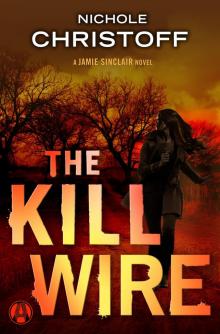 The Kill Wire
The Kill Wire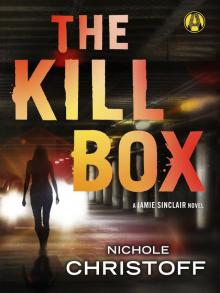 The Kill Box
The Kill Box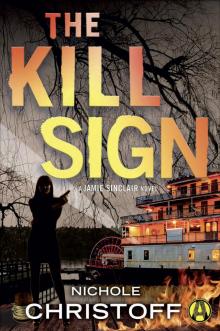 The Kill Radius
The Kill Radius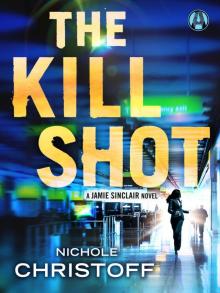 The Kill Shot
The Kill Shot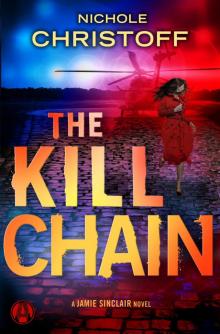 The Kill Chain
The Kill Chain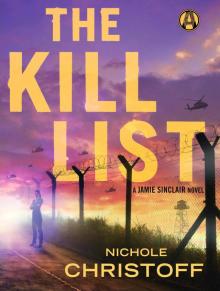 The Kill List
The Kill List